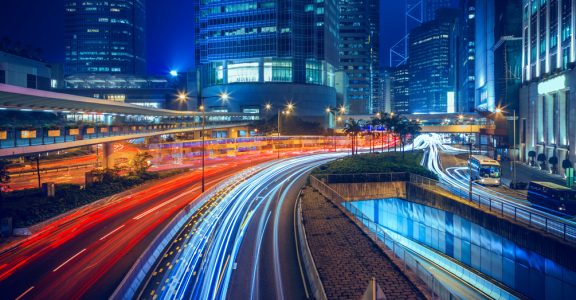Smart IOT London 2018: Smart Cities - Dispatch Weekly
March 29, 2018 - Reading time: 9 minutes

SMART IOT LONDON is the biggest IOT event in the sector. It is held every year at the EXCEL and is part of a bigger event called Cloud EXPO Europe. This year’s event gathered companies working in the “Internet of Things” sector. These are primarily software and platform companies specialised in storing and analysis data broadcasted by sensors.

What are Smart Cities?
A smart city is an urban area that uses different types of electronic data collection sensors to supply information which is used to manage assets and resources efficiently. This includes data collected from citizens, devices, and assets that are processed and analysed to monitor and manage traffic and transportation systems, power plants, water supply networks, waste management, law enforcement, information systems, schools, libraries, hospitals, and other community services
For instance, the city of Dublin has found a way to encourage cycling through data analysis. The government had given away some free light for bicycles. Those lights were equipped with sensors and a chip. The components were collecting data like position, miles, distance travelled or pollution level. These data helped the government to identify the road and the path that was causing issues and resolve them. As the « Internet of Things » is constantly expanding and more and more objects and devices are connected, this process allows the collection of more data and could be the response to many issues.
The question of a « Wifi Free » everywhere in the city centres was a requirement for all the speakers present at this conference. Indeed, more Wifi means more connexion between devices and more data collected. First of all, a Wifi Free everywhere in the city centre would encourage more people to come to the heart of the city. Then those data could help local shops owners to optimise their incomes. Indeed, they would have a better knowledge of the attendance of their shop and their customer base. Those data will allow them to optimise their ads, marketing, opening times and products.
The challenges
At the conference “Smart Cities: The good, the bad and the ugly” we saw on the 22nd of March 2018 at ExCel, one of the speakers said that one of the biggest challenges was to engage people in this concept. Indeed, the citizens often find that the return on investment is not worth it. Barry Lowry, the Irish Government CIO, mention the fact that Ireland was a small country. Small enough so people can work in a city and live in another, in this case, those people are established in one proper city and are not able to enjoy the smart city’s innovation like others.
The best way to engage people in it is to create local smart projects. This way, citizens can see direct benefits in their daily life after they can enlarge the scale step by step. For instance, create a local app for babysitting to facilitate the research for parents who want to spend time without their kids. Like a “local Apple store.”

Another big challenge for smart cities establishment that was mentioned during the talk at Smart IOT is the privacy invasion issue. As cities are getting smarter, more data will be collected. In the actual context of the scandal between Facebook and Cambridge Analytica about the use of personal data, this question is even more complex. The companies and the Government need to find a balance between collecting data and breaking into the private life of the citizens to find what’s healthy or not.
Finally, the last challenge for digital cities is to unite the infrastructure of the city. Indeed, they often don’t have the same interests and goals. The first thing to fix is to find a common interest for those different decision infrastructures so they can apply the right policies.
The role of O2

One big company involved in the smart sector is the telecom company O2, who have trust and promote the smart city in order to upgrade our cities and increase our well being. O2 especially praise and develop the 5th Generation network connectivity (5G), which is a key technology for the future of smart cities. “5G will provide a new level of underlying connectivity to transform services and create new digital ecosystems that will deliver cost and time savings and new amenities to a city’s inhabitants,” says « The value of 5G for cities and communities report » published by O2. Indeed, 5G will be faster, and more efficient, it will allows us to improve things like cloud computing (learn more about it here). At the conference “Developing the digital city – a telco perspective” presented by Alastair MacMahon (Analytic Director, O2 Digital), we learn that the company collects three type of data. The location data, the behavioural data (websites and apps) and finally the street scale data (Wifi and Gps). Those data come from 32m users and helps to analyse and to resolve issues in sectors like Healthcare, Transport, Commerce, and Energy.
5G enabled technology could, for instance, allows the development of telehealth video conferencing, or improve the health devices through better connectivity. As a result, 1.1 million hours per year could be saved for the NHS.
In the Energy sector, the spreading of 5G could further democratize the energy supplier market and give more choice to the consumer. The data collection will be better, and those numbers will be transferred to the consumers who could reduce and adapt their consumption. This would benefit the environment, the UK economy, and the consumers.
The commerce will never have been easier. Indeed, with the Help of data analysing, shops could get exactly what the customers want, when and where. Plus, the issues with delivering parcels or late delivery would be reduced as well. Shops, where payment is not made at the checkout but is made directly on your phone when you leave the shop is the future and will help us save time in our daily life (ex: Amazon Go in Seattle).
Finally, the last sector evoked by O2’s report is the Transport, a key sector for the smooth operation of a city. “Did you know that cancellations or delays resulting in employee lateness or absence, cost the UK economy £10 billion per year in lost productivity.” The introduction of 5G will decrease this number by doing things like: reduce traffic, reduce C02 emissions and increase dynamicity.
There is no doubt that Smart City is the future of our towns, but they need to be developed in good conditions and in a good personal data and private life balance.


DW Staff
David Lintott is the Editor-in-Chief, leading our team of talented freelance journalists. He specializes in covering culture, sport, and society. Originally from the decaying seaside town of Eastbourne, he attributes his insightful world-weariness to his roots in this unique setting.




